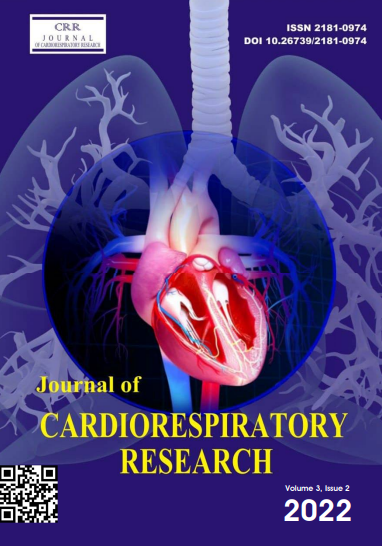ВЛИЯНИЕ МЕТАБОЛИЧЕСКИХ И СЕРДЕЧНО-СОСУДИСТЫХ ЗАБОЛЕВАНИЙ НА ТЕЧЕНИЕ COVID-19
Ключевые слова:
COVID-19, SARS-CoV-2, гипертония, сахарный диабет, сердечно-сосудистые заболевания.Аннотация
В статье описаны влияние сердечно-метаболических сопутствующих заболеваний на тяжесть и течение COVID-19. В общей сложности было включено 116 пациентов в исследование. Максимальный риск развития критического или смертельного заболевания COVID-19 наблюдался у пациентов с основным сердечно-сосудистым заболеванием [ОШ: 3,44, 95% ДИ: 2,65–4,48], за которым следовали хронические заболевания легких, гипертония и сахарный диабет. Из общего числа случаев 64% имели одну из четырех сопутствующих патологий (диабет, гипертония, хроническое заболевание легких или сердечно-сосудистые заболевания), наиболее распространенной из которых является гипертония с объединенной распространенностью 27%. Наличие сопутствующих заболеваний, таких как сердечно-сосудистые заболевания, хронические заболевания легких, гипертония и сахарный диабет, привело к более высокому риску развития критического или смертельного заболевания COVID-19, причем максимальный риск наблюдался при основном сердечно-сосудистом заболевании.
Библиографические ссылки
Anderson R.M., Fraser C., Ghani A.C., Donnelly C.A., Riley S., Ferguson N.M., et al. Epidemiology, transmission dynamics and control of SARS: the 2002-2003 epidemic. Philos Trans R Soc Lond B Biol Sci. 2004 Jul 29;359(1447):1091–1105.
Al-Omari A., Rabaan A.A., Salih S., Al-Tawfiq J.A., Memish Z.A. MERS coronavirus outbreak: implications for emerging viral infections. Diagn Microbiol Infect Dis. 2019 Mar;93(3):265–285.
Dhama K., Khan S., Tiwari R., Sircar S., Bhat S., Malik Y.S., et al. Coronavirus disease 2019-COVID-19. Clin Microbiol Rev. 2020 Sep 16;33(4)
García L.F. Immune response, inflammation, and the clinical spectrum of COVID-19. Front Immunol. 2020; 11:1441.
Yang X., Yu Y., Xu J., Shu H., Xia J., Liu H., et al. Clinical course and outcomes of critically ill patients with SARS-CoV-2 pneumonia in Wuhan, China: a single-centered, retrospective, observational study. Lancet Respir Med. 2020 May;8(5):475–481.
website cdc Centers for Disease Control and Prevention People who are at higher risk for severe illness. https://www.cdc.gov/coronavirus/2019-ncov/need-extra-precautions/people-at-higher-risk.html Accessed on.
Wu C., Chen X., Cai Y., Xia J., Zhou X., Xu S., et al. Risk factors associated with acute respiratory distress syndrome and death in patients with coronavirus disease 2019 pneumonia in wuhan, China. JAMA Intern Med. 2020 Jul 1;180(7):934–943.
Mills K.T., Stefanescu A., He J. The global epidemiology of hypertension. Nat Rev Nephrol. 2020 Apr;16(4):223–237.
Khan M.A.B., Hashim M.J., King J.K., Govender R.D., Mustafa H., Al Kaabi J. Epidemiology of type 2 diabetes - global burden of disease and forecasted trends. J Epidemiol Glob Health. 2020 Mar;10(1):107–111.
Guo W., Li M., Dong Y., Zhou H., Zhang Z., Tian C., et al. Diabetes is a risk factor for the progression and prognosis of COVID-19. Diabetes Metab Res Rev. 2020 Mar 31:e3319.
Hodgson K., Morris J., Bridson T., Govan B., Rush C., Ketheesan N. Immunological mechanisms contributing to the double burden of diabetes and intracellular bacterial infections. Immunology. 2015 Feb;144(2):171–185.
Guzmán-Flores J.M., López-Briones S. [Cells of innate and adaptive immunity in type 2 diabetes and obesity] Gac Med Mex. 2012 Aug;148(4):381–389.
Shu C.J., Benoist C., Mathis D. The immune system's involvement in obesity-driven type 2 diabetes. Semin Immunol. 2012 Dec;24(6):436–442.
Nishiga M., Wang D.W., Han Y., Lewis D.B., Wu J.C. COVID-19 and cardiovascular disease: from basic mechanisms to clinical perspectives. Nat Rev Cardiol. 2020 Sep;17(9):543–558.
Fried J.A., Ramasubbu K., Bhatt R., Topkara V.K., Clerkin K.J., Horn E., et al. The variety of cardiovascular presentations of COVID-19. Circulation. 2020 Jun 9;141(23):1930–1936.
Wark P.A.B., Johnston S.L., Bucchieri F., Powell R., Puddicombe S., Laza-Stanca V., et al. Asthmatic bronchial epithelial cells have a deficient innate immune response to infection with rhinovirus. J Exp Med. 2005 Mar 21;201(6):937–947.
Contoli M., Message S.D., Laza-Stanca V., Edwards M.R., Wark P.A.B., Bartlett N.W., et al. Role of deficient type III interferon-lambda production in asthma exacerbations. Nat Med. 2006 Sep;12(9):1023–1026.

